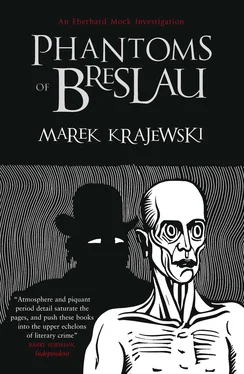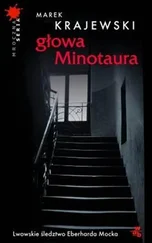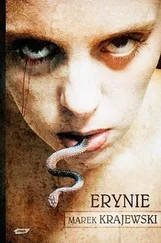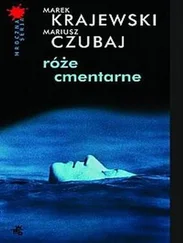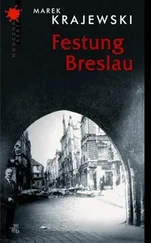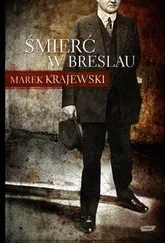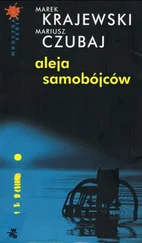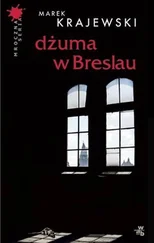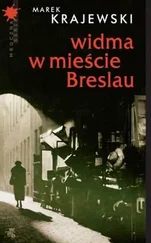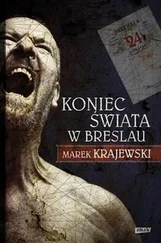Marek Krajewski - Phantoms of Breslau
Здесь есть возможность читать онлайн «Marek Krajewski - Phantoms of Breslau» весь текст электронной книги совершенно бесплатно (целиком полную версию без сокращений). В некоторых случаях можно слушать аудио, скачать через торрент в формате fb2 и присутствует краткое содержание. Жанр: Полицейский детектив, на английском языке. Описание произведения, (предисловие) а так же отзывы посетителей доступны на портале библиотеки ЛибКат.
- Название:Phantoms of Breslau
- Автор:
- Жанр:
- Год:неизвестен
- ISBN:нет данных
- Рейтинг книги:3 / 5. Голосов: 1
-
Избранное:Добавить в избранное
- Отзывы:
-
Ваша оценка:
- 60
- 1
- 2
- 3
- 4
- 5
Phantoms of Breslau: краткое содержание, описание и аннотация
Предлагаем к чтению аннотацию, описание, краткое содержание или предисловие (зависит от того, что написал сам автор книги «Phantoms of Breslau»). Если вы не нашли необходимую информацию о книге — напишите в комментариях, мы постараемся отыскать её.
Phantoms of Breslau — читать онлайн бесплатно полную книгу (весь текст) целиком
Ниже представлен текст книги, разбитый по страницам. Система сохранения места последней прочитанной страницы, позволяет с удобством читать онлайн бесплатно книгу «Phantoms of Breslau», без необходимости каждый раз заново искать на чём Вы остановились. Поставьте закладку, и сможете в любой момент перейти на страницу, на которой закончили чтение.
Интервал:
Закладка:
“We spoke about women later,” Ruhtgard said, lighting a cigarette, “when the Russians started singing their dumkas. †We’d stare at the starry sky and each one of us would think about warm bodies, soft breasts, smooth thighs …”
“Cornelius, stop making things up.” Mock pushed aside the empty plates, lit a cigarette and poured another two shots from the carafe. “We didn’t talk about women , but about one woman. Each one of us spoke about one woman. I told you about my romantic ideal, about the mysterious, red-headed, unknown Lorelei from the hospital in Konigsberg, while you only talked about …”
“My daughter, Christel.” Ruhtgard drank without waiting for Mock. “About my little princess Christel who now flirts with men, who smells of rutting …”
“Let it go.” Mock was suddenly very thirsty. He pulled the curtain aside to summon a waiter with a frothy tankard. “Your little princess is now a grown-up young lady and ought to be getting married.”
Ruhtgard threw off his jacket and began to unbutton his waistcoat.
“Mock, my brother!” he shouted. “Our friendship is like that of Patroclus and Achilles! Let’s exchange waistcoats, as Homer’s heroes exchanged their armour!”
As he said this Ruhtgard threw off his waistcoat and sat down heavily. A moment later black sleep, brother of death, descended over him. Mock left the alcove to look for a waiter, but instead caught sight of the drunken smile of the Jewish-looking girl who was swaying on the dance floor, alone, her handbag slung over her neck. He also saw spilled schnapps, stained tablecloths and the white dust of cocaine; he saw a soldier hiding pamphlets under his greatcoat; he saw his friend, Doctor Ruhtgard, who had once saved his life in a town on the Pregolya. He clicked his fingers and a young waiter appeared.
“Be so kind,” Mock could scarely pronounce the syllables as he went through the notes in his wallet, “as to call a droschka for me and my friend… And then help me carry him to it …”
“I can’t do that, sir,” said the lad, putting the ten-mark note in his pocket, “because our manager, Mr Bilkowsky, doesn’t allow the hiring of fiacres. Their horses foul the pavement in front of the hotel. For important patrons such as yourself, sir — I saw you here yesterday, and again today — and your friend, we provide our own automobile. The chauffeur has just arrived outside, and he’s probably still free.”
The young waiter disappeared. Mock returned to his alcove, paid the head waiter for his supper, and then spent a long time tying his laces, a task much hindered by a belly bloated with the heavy delicacies. Puffing and panting, he helped Doctor Ruhtgard to the beautiful Opel whose roof was adorned with a flag bearing the Austrian eagle and the name of the hotel. The automobile made its way through the city. The night was warm. The people of Breslau were preparing for sleep. Only one man was preparing himself for a meeting with phantoms.
BRESLAU, THURSDAY, SEPTEMBER 4TH, 1919
TWO O’CLOCK IN THE MORNING
The net curtain billowed at the open window. Mock sat at the table, listening to his father’s snoring. Beyond the window, a shaft of light from the gas lamp in the square yard illuminated the pump where Pastor Gerds’ maid stood stretching lazily and gazing at Mock’s window with a smile. She stroked the arm of the pump and wrapped her whole body around it. The pump played a rusty tune into the night. Water poured into a bucket while the pastor’s maid, swinging on the lever, kept on smiling up at Mock’s window. Once the bucket was full, she slid lower and squatted, holding on to the upper part of the lever. Her nightdress strained across her buttocks, the pump lever protruding between them. Smiling, she glanced one more time at Mock’s window, picked up the bucket and made towards the gate. Mock listened intently. The bucket clanked against the window of what used to be the butcher’s shop. The bell tinkled gently. He heard light footsteps on the stairs. Mock got up and looked closely at his father, fast asleep. Then he crept to his bedroom alcove, lay on his bed and pulled his nightshirt up to his chest. He waited, tense. The hatch in the floor squeaked. He waited. A window casement blew against the wall. Crash. The trapdoor in the corner of the room hit the floor with a dull thud. His father muttered something in his sleep. Mock got up to close the window and, at that very moment, heard what he had feared. The tin bucket tumbled down the stairs. Every stair forced from it an ear-piercing racket. The empty bucket rasped against the sandstone slabs and landed in a puddle.
“Do you have to make such a noise, damn it?” said his father, opening his eyes and immediately closing them again. He turned over and began to snore.
Mock doubled over to conceal his arousal, then covered himself with his nightshirt and tiptoed to approach the hatch. He knew how to open it without it squeaking; he had done so many a time when he returned drunk and did not want to hear his father say: “You’re always knocking it back”. He half-opened the hatch and peered into the depths of the butcher’s shop. Light footsteps on the stairs. From the square of darkness loomed a head and neck. Wisps of pomaded hair were arranged in an intricate curl; the neck was covered with flaking eczema. The head tipped back to reveal congealed red lava flowing from its eyes. The mouth opened and spat a bubble of blood. More appeared, bursting without a sound. Director Julius Wohsedt looked far less handsome than he had at the launching of the ship Wodan.
Mock quickly backed away from the trapdoor and tripped over a basket of logs. Flapping his arms, he knocked down a large bottle of paraffin.
“Ebi, wake up, damn it!” His father was shaking his arm. “Look what you’ve done!”
Sitting amongst the shards of glass, he felt the burning of small cuts on his legs and buttocks. Threads of his blood meandered over the surface of the paraffin. The hatch was closed.
“I must be a lunatic, Father,” he croaked, his breath reeking of four large shots of schnapps.
“Knocking it back, always knocking it back.” The old man waved him aside and shuffled over to his bed. “Clean it up — it stinks and it’ll stop me sleeping. We’ll have to air the room.” He opened the window and looked at the sky. “You’re a drunkard, not a lunatic. There’s no moon tonight, you idiot.” He yawned and clambered into the warm refuge of his quilt.
Mock took the first-aid kit which hung on the wall. His father had put it together himself when they moved in: “So that no inspector picks on us. Every workshop ought to have a first-aid kit. That’s what the labour law says.” Hammering little nails into the pale planks, he had did not want to hear the fact that the apartment was not a craftsman’s workshop and that he himself had not been a shoemaker for some time.
Mock gathered up the shards, removed his nightshirt and used it to wipe the floor. He felt the cold instantly. “Not surprising,” he thought. “After all, I’m naked.” He threw over his shoulders an old coat which served him in winter for his trips to the toilet, took an iron candlestick from the kitchen and opened the hatch. His back prickled. In the weak glow of the street lamp outside the shop, he looked down the stairs. Empty and dark. Cursing his own fear under his breath, he lit his way with the candle. There was no bucket below, nor any trace of spilled water. Mock squatted to study the drain in the floor, listening for sqeaking rats. Nothing. Silence. A shadow glided across the wall. Mock felt a rush of adrenaline, his hair stood on end and he began to sweat. Postman Dosche and his dog with its upset bowels had crossed Plesserstrasse. Mock felt a gust of cold wind. All of a sudden he remembered his grandmother, Hildegard, who considered a downy duvet a remedy for everything. In her well-scrubbed kitchen in Waldenburg, she would wrap the duvet around little Franz and little Eberhard, saying: “Hide your heads in the duvet. The room’s cold. And where it is cold there are evil spirits. It’s a sign from them.”
Читать дальшеИнтервал:
Закладка:
Похожие книги на «Phantoms of Breslau»
Представляем Вашему вниманию похожие книги на «Phantoms of Breslau» списком для выбора. Мы отобрали схожую по названию и смыслу литературу в надежде предоставить читателям больше вариантов отыскать новые, интересные, ещё непрочитанные произведения.
Обсуждение, отзывы о книге «Phantoms of Breslau» и просто собственные мнения читателей. Оставьте ваши комментарии, напишите, что Вы думаете о произведении, его смысле или главных героях. Укажите что конкретно понравилось, а что нет, и почему Вы так считаете.
